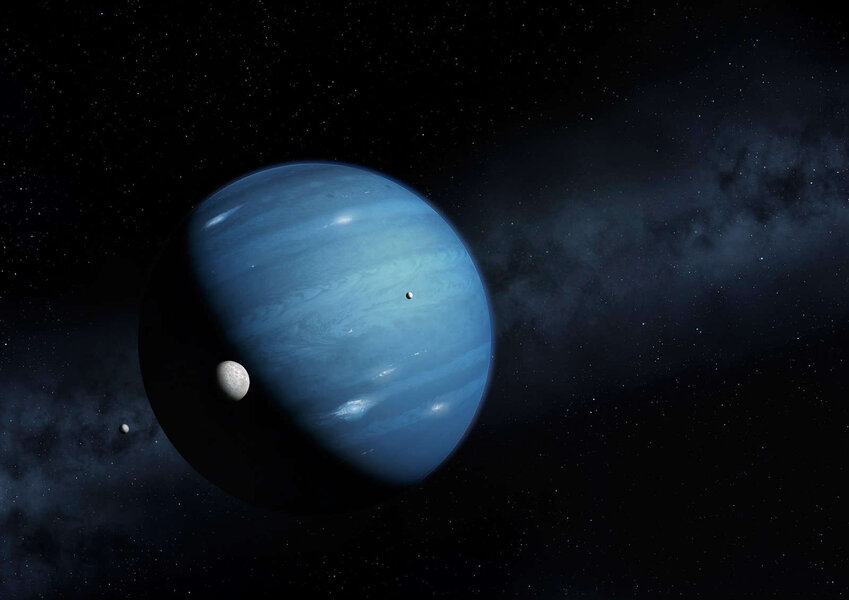Create a free profile to get unlimited access to exclusive videos, sweepstakes, and more!
Mea culpa: Planet definitions and Earth clearing its orbit
Would Earth still be considered a planet if it were out in Neptune’s orbit?

Every now and again, I screw up.
Oh, it’s extremely rare when I write an article (cough cough), but it happens. Sometimes it’s small enough that I’ll just issue a correction in the text and then forget about it, because hey, that happens. But other times it’s either big enough or an interesting enough mistake that it’s worth following up.
Mea culpa is Latin for “my fault.” So, mea culpa.
In this case it’s a point I’ve actually made a few times when talking about trying to define what a planet is.
To be clear right off the bat, I have held the position for a long time — and I still do — that the term planet is not definable. It’s a concept, not a hard and fast rule. You can try to define what a planet is, and I will be able to find exceptions; either something is obviously a planet but the rules says it shouldn’t be, or something that obviously isn’t but the rules say it should.
This came about due to the International Astronomical Union’s foolhardy attempts to create a definition in 2006. Whatever their motivation — and it was brought about by the discovery of Eris, an object about the same size as Pluto out beyond Neptune — in my opinion the definition fails.
The IAU made three rules to define a planet, and it’s the third that caused a lot of grief. That rule states that a planet, “has cleared the neighbourhood around its orbit.” They mean that it’s an object with sufficient mass and gravity that any object of similar size and in a similar orbit has been either dropped closer to or farther out from the Sun, such that the neighborhood around the planet is cleaned up of these objects.
The problem is they didn’t really define what that means. How clear of an orbit do they mean?
Here’s where my own mistake comes in. For example, in this article about the discovery that the asteroid Hygiea is round, I mention that if Earth were moved out to Neptune’s location, the space around it would be so vast that it wouldn’t clear its neighborhood, and so wouldn’t be called a planet anymore.
And that, it turns out, is wrong.
After that article went up in 2019, I received an email from astronomer Jean-Luc Margot at UCLA. He has done some work in this field, and said that claim was wrong. And he sent me a paper he published that shows why [link to paper].
The idea here is that an object of sufficient mass will dynamically dominate the space around it, meaning any smaller object will eventually get gravitationally perturbed by it, and moved into a different orbit.
He then quantifies this. He starts with the Hill Sphere, the volume around a planet where its gravity dominates over the host star. That’s a roughly definable volume using physics. Now imagine a small object in a circular orbit around the Sun very similar to the planet’s. If it gets too close, the planet will affect the object so much that the object’s orbit changes substantially. In Margot’s definition, it has to move the object so that it never comes as close as some numerical factor times the size of the Hill Sphere. The physics for that factor works out to be 2 times the square root of 3, or about 3.5.
This process of changing the object’s orbit is essentially a random one, but builds up over time. He sets an upper limit to the time it takes as the lifetime of the host star, which makes sense; if an object can’t clear its orbit over that amount of time it never will.
Working through the physics, Margot finds, for example, that for the Earth — given its mass and distance from the Sun — it clears its neighborhood in roughly a million years. That’s very short compared to the Sun’s 4.6 billion-year lifetime already. So hurray, Earth is a planet by that definition.
He also finds that this condition is still true until you move the Earth out to a distance of 60 billion kilometers. Up until that distance, over time, the Earth will still clean up its neighborhood of smaller objects.
Neptune is 4.5 billion kilometers from the Sun, much closer than 60 billion. Therefore, move the Earth out to Neptune’s orbit and it’ll still clear its neighborhood.
I was wrong. Mea culpa. I’ll stop using that as an example.
He goes further, though. Pluto, Eris, and the protoplanet Ceres only have about 1% of the mass needed to do this, so they are not planets in the definition. OK. As of 2015, when he first did this work, 99% of all planets seen at that point orbiting other stars would have enough mass to fit the criterion, so they would be true planets — though by the IAU’s definition we only say “planet” for one orbiting the Sun; these other objects would be exoplanets.
Also, interestingly, any object big enough to clear its orbit would also be massive enough that its gravity would shape it into being round, which was another IAU rule.
It’s still true that if you move Earth far enough from the Sun it wouldn’t be a planet anymore, just a lot farther than I thought, and that still bugs me. He notes that we do sometimes change an object’s definition based on circumstances; for example if an asteroid hits the Earth it becomes a meteorite. That’s true, but what if we use a spacecraft to grab a small asteroid and bring it down to Earth? It’s not a meteorite then, so even this definition is fuzzy.
And that brings me back to my overall point: Sometimes defining things in absolute terms doesn’t make sense. Nature rarely draws such lines in the sand. Sex isn’t binary, colors blend into one another, viruses seem to be almost alive, and so on. And worse, things change over time. If Earth is a planet when it’s 59.9999999 billion kilometers from the Sun, or whatever the exact number is, then it feels wrong to suddenly change that definition if it moves a couple more kilometers out? At some point you have to admit that definitions can be a little arbitrary even when rigidly declared.
And if that’s the case, the problem isn’t in the definition, it’s in the fact that you tried to define something that isn’t really definable.
So sure, mea culpa about moving the Earth, but I’m still feeling pretty confident that defining what a planet is or isn’t is always going to lead to trouble. It’s helpful to get a general idea about an object — is it a star, a brown dwarf, a planet, a moon, an asteroid? — but if you worry too much about that sandy line you’ll wind up biasing the way you see the object.
Nature is loosey goosey about nearly everything. I don’t think we should be so rigid when the entire cosmos isn’t.
















